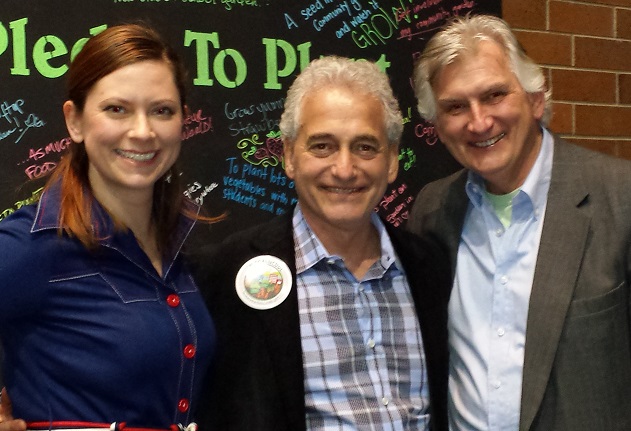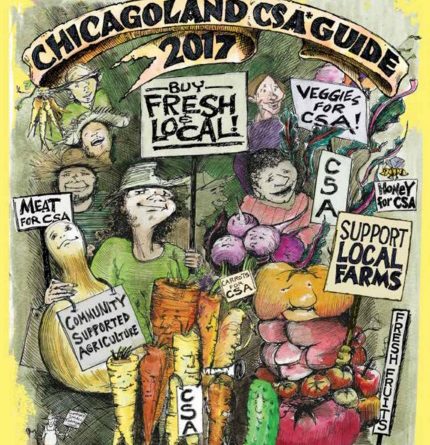March 11, 2017 – Countdown to Good Food
The Mike Nowak Show with Peggy Malecki hits the road next week, broadcasting live from the Good Food Festival & Conference at the UIC Forum in Chicago. And our coverage of this annual event, which is the nation’s oldest and biggest trade show focused on local and sustainable food, wouldn’t be complete without a chat with the guy who started this event, Jim Slama:
Jim Slama founded FamilyFarmed at a time when few people recognized the term “Good Food movement,” and demand for locally, sustainably, humanely, and fairly produced food was still a tiny sliver of the overall consumer market. Under Slama’s leadership during more than 15 years since, FamilyFarmed has become an important catalyst in the booming, consumer-driven rise of the movement, helping to build a robust Good Food cluster in its home base of Chicago while expanding the national scope and impact of its work.
How successful has this festival been? More than 700 unique speakers have participated over the years, and more than 5,000 people participated in the 2015 Good Food Festival & Conference alone. That’s how successful.
As I wrote last week, the three separate days represent three different areas of food sustainability:
- Thursday, March 16, is the Financing and Innovation Conference, where food and farm businesses gain access to capital.
- Friday, March 17 is the Trade Show and Policy Conference, when farmers, producers, buyers, schools and industry stakeholders meet to share knowledge and discuss policy developments.
- Saturday, March 18, is the culmination of the event–The Good Food Festival, a day celebrating Good Food! Discover new artisanal goods from more than 150 exhibitors, learn from workshops and chefs demos, and explore family-friendly programming, And this year, admission is FREE! All you have to do is register here.
 And for the second straight year, The Mike Nowak Show will be broadcasting LIVE from Saturday’s Good Food Festival at the UIC Forum. This year, the broadcast will be on our new station, 1590 WCGO. You can listen to it live on AM Radio or stream it from 1590 WCGO, www.mikenowak.net or any number of radio apps.
And for the second straight year, The Mike Nowak Show will be broadcasting LIVE from Saturday’s Good Food Festival at the UIC Forum. This year, the broadcast will be on our new station, 1590 WCGO. You can listen to it live on AM Radio or stream it from 1590 WCGO, www.mikenowak.net or any number of radio apps.
Getting back to Jim Slama, FamilyFarmed is just one of the ways he has been paying for his ride on this planet. He was the founding publisher and editor of Conscious Choice magazine, and he started the public affairs group called Sustain. He has led campaigns to shut down incinerators and prevent oil drilling on the shores of Lake Michigan. He was even able to get Congress to establish a real recycling system, when it was revealed that theirs was…well, less than robust. It’s a pleasure to have him back on the show.
Mike and Peggy catch up on some issues
If you’re a regular listener to the show, you know that Peggy and I love to talk to people, whether about issues or events or science or all of the above. But sometimes, we need to step back and look at the bigger picture. There’s a lot going on out there and when you have a radio show that’s on only once a week, you can’t possibly cover all of it. So today, we’re taking a little time to do some “headline news” about things that have come across our desks.
- “If we Lose the EPA, we lose Lake Erie”It didn’t take long for the Trump Administration to train its sights on the Environmental Protection Agency, with the goal of turning it into a shell of itself, if not killing it altogether. Last week, reports came out that the the White House could could cut the EPA budget from $8.2 billion to $6.1 billion and slash staff by 3,000 employees. That includes a projected 97% cut in funding for the Great Lakes Restoration Initiative which “was launched in 2010 to accelerate efforts to protect and restore the largest system of fresh surface water in the world — the Great Lakes.”
We have a lost our minds and our way. The Alliance for the Great Lakes released a statement saying, in part, “We have seen the tragedy and heartbreak that occurs when our nation’s clean water programs fail. Lead-tainted drinking water flowing from taps in Flint, Michigan. Toxic algal blooms shutting down Toledo, Ohio’s drinking water system. These are just two examples from a list longer than is acceptable in the United States of America. If anything, evidence indicates that federal environmental protections should be more aggressive and accountable, not less.” Amen to that.
- If you haven’t seen the Band of Farmers Chicagoland CSA Guide 2017 yet, you need to. You can click the link here or you can pick up a copy of the March issue of Natural Awakening Chicago Magazine to see the 24-page spread in its full glory.If you’re not familiar with the Band of Farmers, it is “a coalition of Community Supported Agriculture (CSA) farms servicing the greater Chicago area. Borrowing heavily from the groundbreaking work of FairShare CSA Coalition in Madison, Wisconsin (formerly MACSAC), Band of Farmers joined forces primarily to collaborate on educating consumers about local foods in general and the CSA model in particular.
Not to put too fine a point on it, this is simply the best and most comprehensive local CSA brochure I have ever seen! You need to grab a copy and keep it in a safe place. Or bookmark the above link and refer to it when you’re shopping for a CSA. Which you should. Congratulations to the Band of Farmers and especially Robin Schirmer, who had a lot to do with the final product.
- Going Green Matters is Go Green Wilmette’s Environmental Fair, Sunday, March 12 from 12-4pm.
Going Green Matters draws more than 1,000 residents, neighbors, elected officials, exhibitors and volunteers. The latest hybrid and electric cars, demonstrations, home energy exhibits, and the ever popular interactive Eco-Zone make this a wonderful event for the entire family.
People interested in living more sustainably will have a chance to learn more about topics such as saving energy at home, transportation choices, green landscaping, growing your own food, organic food and farming, connecting to nature, green home design and products, and more. Find out how schools, park districts, libraries, congregations and village governments are all working together to make our communities and the world a more sustainable place to live.
- It’s not to late to register for the TreeKeepers course, which starts next week. I received this message from Openlands:
Registration is still open for Openlands spring TreeKeepers course! TreeKeepers are a network of volunteers who take an active role in caring for the trees around Chicago. The eight-day certification course will be held this spring at McKinley Park, Wednesday evenings and Saturdays.
Becoming a TreeKeeper has numerous benefits both on the professional and personal level. New TreeKeepers join a network of over 1,800 internationally-respected volunteers and the course offers professional certification. Once you complete the course and are certified, TreeKeepers are an egalitarian network, so everyone can get involved right away. It is a commitment to taking responsibility for the care of our city, there are volunteering opportunities most weekends between April and October, and it is a great way to spend your weekends outdoors.
TreeKeepers help Openlands’ forestry team, and together they have planted nearly 4,000 trees across the city in the last 4 years. TreeKeepers are further encouraged to work with their local municipalities and neighbors to improve local tree care.
For more information, please visit openlands.org/treekeepers
- The Environmental Working Group (EWG) has come out with its 2017 Dirty Dozen™ list, featuring the EWG Shopper’s Guide to Pesticides in Produce™ (they do like their trademarks, don’t they?) As usual, strawberries top the list, though spinach made a move along the inside rail to take second place. Among the findings:
- Nearly all samples of strawberries, spinach, peaches, nectarines, cherries and apples tested positive for residue of at least one pesticide.
- The most contaminated sample of strawberries had 20 different pesticides.
- Spinach samples had an average of twice as much pesticide residue by weight than any other crop. Three-fourths of spinach samples had residues of a neurotoxic pesticide banned in Europe for use on food crops – it’s part of a class of pesticides that recent studies link to behavioral disorders in young children.
By the way, there is also an EWG Clean Fifteen™ list of produce least likely to contain pesticide residues. That list features “sweet corn, avocados, pineapples, cabbage, onions, frozen sweet peas, papayas, asparagus, mangoes, eggplant, honeydew melon, kiwis, cantaloupe, cauliflower and grapefruit. Relatively few pesticides were detected on these foods and tests found low total concentrations of pesticide residues on them.”
- Last but by no means least, I’m heading out after this morning’s show to the 7th Annual Forest Park Community Garden Seed Swap. Here are details:Saturday March 11th 2-4PM
St. John’s Church
305 Circle Ave. – Forest Park
The swap is free, as long as you RSVP in advance (above link), or $2 at the door. I will be trying out a presentation that I will be debuting at the Chicago Flower & Garden Show on Monday, March 20. It’s called “Everything You Know About Gardening is Wrong: Myths, Misinformation and Well-meant, But Inaccurate Advice From Mom, the Intertubes and Beyond.” It starts at 2:15pm and the swap will begin at 3pm.


